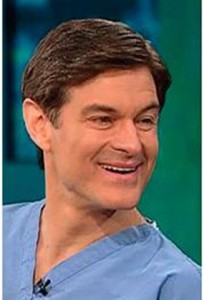Warning: Dr. Mehmet Oz Is Not A Trustworthy Source Of Health Information
 When I was in medical school at Columbia University College of Physicians and Surgeons, Dr. Mehmet Oz had the reputation of being a competent and caring cardiothoracic surgeon whose research interest was reducing preoperative stress. I remember hearing about a music study of his in which soothing melodies reduced blood pressure and heart rates in patients preparing for heart surgery. I felt pleased that a surgeon was leading the charge in improving patients’ O.R. experiences, and had no inkling that 15 years later Dr. Oz would be America’s chief snake oil salesman.
When I was in medical school at Columbia University College of Physicians and Surgeons, Dr. Mehmet Oz had the reputation of being a competent and caring cardiothoracic surgeon whose research interest was reducing preoperative stress. I remember hearing about a music study of his in which soothing melodies reduced blood pressure and heart rates in patients preparing for heart surgery. I felt pleased that a surgeon was leading the charge in improving patients’ O.R. experiences, and had no inkling that 15 years later Dr. Oz would be America’s chief snake oil salesman.
I have been slow to criticize Dr. Oz on my blog because of a sense of loyalty to my medical school, however yesterday he crossed the line when things got personal – a friend of mine was negatively impacted by his misinformation to the point where her life was endangered. From watching his TV show, she was led to believe that she would put herself at risk for thyroid cancer if she got a mammogram. Several of her relatives have had breast cancer, and she should be particularly vigilant in her screening efforts. However, because Dr. Oz said that mammograms may themselves cause cancer, she opted out of appropriate screening.
My colleague Dr. David Gorski at Science Based Medicine has done an excellent job of documenting Dr. Oz’s almost Charlie Sheen-like career descent. Although he began his work as (presumably) a science-respecting surgeon, he now spends a lot of his time hosting a TV show that features faith healers, anti-vaccinationists, and psychics.
But how does the average lay person know how to evaluate Dr. Oz’s health claims? When Oprah’s network promotes him as “America’s physician” the platform itself offers him credibility, and a reach that can damage and misinform millions like my friend. I have a feeling that many of my peers at Columbia are concerned about Dr. Oz’s promotion of quackery, but once they’ve invested in his brand for so long, it’s easier to turn a blind eye to his nuttiness than to oust him from his academic positions. At what point is a celebrity doctor doing more harm than good to an institution’s reputation? Is he now “too big to fail?”
But back to my main point – dear readers if you watch Dr. Oz and think that he’s a credible source of health information, please be aware that much of what he says is inaccurate, exaggerated, and based on mystical belief systems. Please don’t act on his advice without checking with your own physician first.
Sadly, good science doesn’t always make good television. But the truth can make you well. Be warned that you are unlikely to find the truth consistently on the Dr. Oz show.











